In the Footsteps of the Great Colin Fletcher
End to End in the Grand Canyon, afoot and out of water!!
The writer Colin Fletcher turned a love for hiking into a full-time career as a writer and outdoorsman. Starting in the early 1960s, he chronicled his amazing treks and philosophical adventures into at least 10 books. Fletcher wrote about his ventures through the remote outdoors, writing passionately and lovingly about wilderness travel. His writings inspired a multitude of people to pick up a backpack and get outdoors. He was a hero and guru to outdoorsmen across the world and is considered the Godfather of modern backpacking.
Fletcher's first book, The Thousand-Mile Summer (1964) records his travel along the length of the eastern border of California, from the Oregon border to Yuma, through forests, lakes and streams, the Sierras, then deserts. It’s his early work and set the stage for his best stuff. His much-revered book, which remains in print today: The Man Who Walked Through Time. This is the autobiographical account of Fletcher walking the length of the Grand Canyon, below the rim, in one continuous attempt with minimal supplies. He takes a route across wild and open lands and never uses an established trail.
As a part-time resident of Flagstaff, Arizona, (75 minutes from GCNP) I've been lucky enough to hike the Canyon rim to rim two times. I have to say, even on the well-maintained trails (ie, Bright Angel Trail, North Kaibab and South Kaibab Trails) this hike is no easy feat. You’re largely walking up or going down. But to hike the length of the Canyon, end to end, horizontally, over terrain that's never been walked, where no trails exist, this seems a near impossible feat.
We've all seen pictures of the Grand Canyon: endless fall-offs, shelves, dramatic drops, and severe side-tributaries throughout a billion years of ancient rock. It’s the land of cliffs that fall thousands of feet, boulders bigger than houses, the impasses that require a hike of dozens of miles to get around. Not to mention the endless side canyons where the depths and distances are enormous. To hike alone, horizontally here? It’s just madness. Yet Colin Fletcher achieved it, a hike of hundreds of miles. He was the first to do it in one try. Then he wrote about it.
This isn’t travel writing, but a book about the freedom of exploration and introspection. Fletcher weaves his way through the physical and mental aspects of his journey. The endless hiking and climbing challenges, the ups and downs through the inner canyons, the vast distances, cliffs and buttes, taking in the views from hanging terraces.
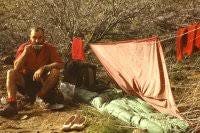
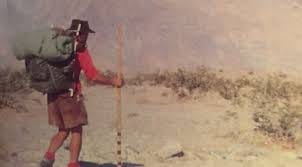
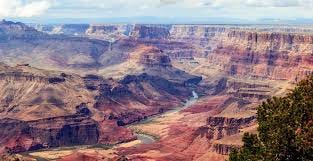
The book reminds us that we all share a love for the natural world, and while he says he was “one with the beaver,” well, we forgive his hyperbole. Notwithstanding that, Fletcher offers intriguing and beautiful descriptions as he struggled for over two months against the heat and cold, a chronic lack of supplies, never enough water, unsleepable “campsites”, the impassable terrain.
The beauty of the book lies in how Fletcher's journey moves from a supreme physical challenge to a spiritual odyssey; how an individual confronts the enormity of nature, the power of time, and a man's place in a vastness he cannot control. Of course, Fletcher does not fight foreign sentiments, he adapts. During his pilgrimage he finds his part in this world, and embraces the wonder and privilege of being one of nature's creations himself.
Fletcher writes from an old school. He's writing about being in nature long before equipment manufacturers shifted our focus from “just go out there and do it” to an emphasis on expensive, fancier, techier gear. Fletcher's world is certainly not about the gear (nor the clothing or fashion!), it's all about the experience. To the extent, if you enjoyed reading The Emerald Mile, (Here’s My Substack on the ultimate thrill ride in the Grand Canyon!) about how Colorado River runners ran the Grand Canyon rapids in a small wooden dory in record time, you'll love The Man Who Walked Through Time.
From this trek and book, Fletcher explored life and continued his hikes of discovery into more and more places, (he wrote about many topics, including Kenya, the Serengeti Desert, and his journey the length of the Colorado River, starting on a small tributary in Wyoming, hiking and paddling all the way to the Gulf of California.
Along the way he published The Complete Walker which is still valued today and has sold over half a million copies. It's considered the Bible of the backpacking set. It’s funny, self-effacing, and a great read for any hiker or camper. Fletcher is quirky and interesting. It's less a book about walking sticks and hiking boots, than it is about personal discovery and spiritual growth.
Finally, there's Fletcher's highly underappreciated work, The Man From the Cave.
There's no other book like it. It aligns with Fletcher's well-traveled path of self-discovery, but in a novel way. In 1968, Fletcher was backpacking through a seriously remote part of Southern Nevada near a virtually impassable section of canyon along the Colorado River. Walking along the edges of a cliff, Fletcher came upon a cave. I’m actually slightly familiar with this part of Nevada. It's a steep gorge across which they built Hoover Dam. The cave’s location is in a gorge about 20 miles downriver from the Dam. There are neither roads nor trails there, it's horrifically steep and dangerous, the sheer rock falling to the Colorado River below at the sharpest angles.
But there he ran across this cave; and even more surprising, he found an old wooden trunk at the mouth of the cave. Exploring further, Fletcher found the remains an encampment of a miner or soldier or hermit. Inside was a crude bed, fire-ring, shelves, handmade table and other items, all crudely fashioned from stones and branches found nearby. Random personal possessions, a few scraps of magazine paper, and that’s about it. All items had been untouched for many years. Naturally, questions come fast: who the heck lived here? What was he doing way out here? What kind of person would live in such a forbidding place?
Fletcher's immediate reaction was something like, “Holy smokes, the guy who lived here was someone just like me! Seeking solitude, happy to live without material wealth, happy to be alone in nature.” Fletcher found the setting to be bizarre yet so intriguing, he returned a year later (it was still untouched) and himself lived in The Cave. What was this hermit looking for? What did he eat? How did he live? What was he all about? The anonymous hermit in The Cave inspired Fletcher to learn more. He became determined to find out about this person and what he was doing there. He slowly set out to unravel the mystery behind the life and times of a total stranger.
Fletcher was intrigued and quickly became gripped by a kindred spirit. He started to do some research. Working on and off, the puzzle of the man in The Cave would take Fletcher 10 years to solve. This book runs through the process of his investigations. Ultimately, this is a tale of how a few tiny items in a long-lost cave can lead to endless detail about a secret individual. With very little to go on, no written records, his only clues being a few torn scraps of paper found in the dust, he relentlessly chases down the man's identity. Hitting dead-end after dead-end, Fletcher's story of pursuit is picked up by the San Francisco Chronicle, which publishes a short article. An old woman happens to read the article and thinks she may have a clue. She contacts Fletcher and says she thinks she knows who the man in The Cave might have been.
This news is one random twist which then ties into two or three more random twists, which ultimately reveal the identity of “Chuckawalla Bill”, a colorful (and somewhat shady) fellow who knocked around the southwest deserts for years. Fletcher goes to military records, the National Archives, talks with elderly souls from Bill’s birthplace in Pennsylvania. Like a good Columbo detective story, he pieces together Bill’s life. He finds people who knew Bill when he was a toddler. He traces Bill’s amazing military record in the Philippines during the Spanish American War. With twists and turns and surprises and roadblocks and false leads, it’s all great fun and a well-told whodunit tale. We meet people who used to drink booze in the desert with Bill, people he crossed with mining claims, women he dated, the little desert towns where he came and went. Bill was a prospector, a drinker, and quite the ladies’ man. The voyage into Chuckawalla Bill’s life and times parallels Colin Fletcher’s own path of discovery, where two fascinating human beings with disparate paths in life somehow intersected at a long-lost hole in the rocks in the middle of nowhere way above the Colorado River.
You read Colin Fletcher to learn about the early days of American adventure writing where hiking, outdoors, nature and won’t-take-myself-too-seriously-introspection all come together. You read Colin Fletcher to appreciate the worth of self-discovery. You read Colin Fletcher for his quirky approach to life, fully knowing that he’s a bit different. You read Colin Fletcher's books to smile at the way some people have the rare ability to embrace the spiritual over the physical. You read about po-dunk little towns in the harsh California desert, and quite a bit about American history, as Chuckawalla Bill tied many threads together. Finally, you read Colin Fletcher because he might inspire you to embark on a crazy adventure of your own; he just might provide the impetus for someone to flee from society for a while, to get out into the remote outdoors.
Colin Fletcher left us in 2007, tragically struck by an SUV. Nowadays he’s often considered to be an environmental writer. This is wrong and unfair, and certainly does not do him justice. It’s a reflection of the sad tendency for modern critics to feel the need to categorize everybody into one genre or another. There's no need to place a modern spin on a beautiful body of work that has far more complexity and a completely different spirit. These are not books about climate changes nor global warming nor long diatribes about preserving natural beauty. This is not philosophical instruction.
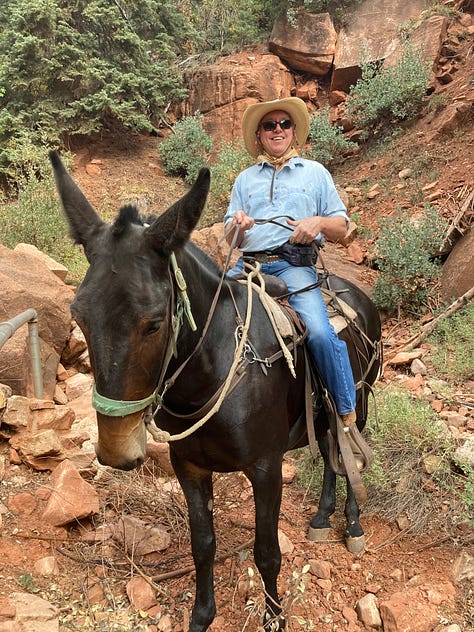
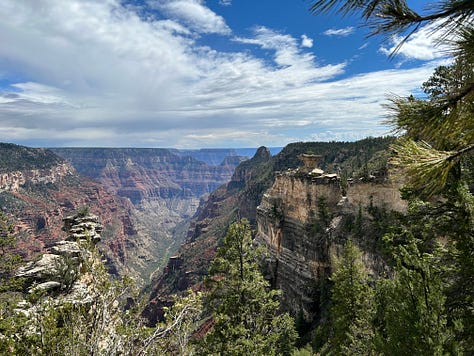
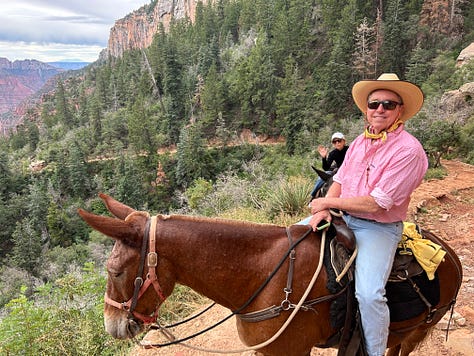
Fletcher is his own unique blend of non-sentimental observation and insight, and that's what makes him such a great writer. Colin Fletcher has made immeasurable contributions to some place in literature where travel writing, outdoor adventure, inner strength, humility and even humor all come together. There’s a purity to his writing that transcends the environmental movements.
Wanna get to know Colin Fletcher? I'd start with The Man Who Walked Through Time . It's a great read for any hiker, outdoorsman, or anyone who's been to the Grand Canyon and can picture how difficult two months of lateral hiking must have been. Then I'd read The Man From the Cave , which is a neat story and reinforces so much of the philosophy that began with Man Who Walked Through Time.
__________________________________________________________________________
As always, thank you for reading and sharing these words. I write novels and stories from my desks in Arizona. My next novel has a working title, so I might share that next time. Meanwhile, all my work is on all the platforms and most descriptive on my website, www.MICHAELDASWICK.com .
Happy Trails,
MD in AZ


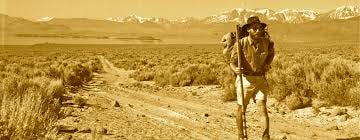
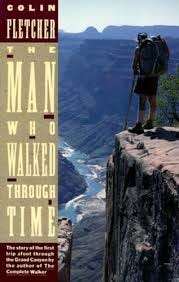
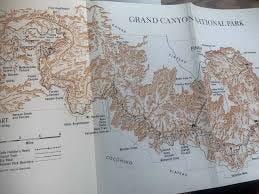
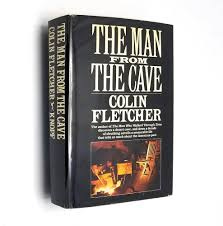
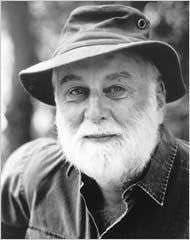
Thanks! 500 pages ++ on CF!
https://www.amazon.com/Walking-Man-Secret-Colin-Fletcher-ebook/dp/B01IS9XP7E/ref=mp_s_a_1_1?crid=AU8376OP8GWR&dib=eyJ2IjoiMSJ9.MZ-HoIoaf60ySPLoIe927GrIX13mC21MIQV3S98zVBbNddyDRzRXqUEVFN9NtiKPsVaF8Efy8eJrgjJYpfVq7ltzeNYNaUE1kRfKFcxDYTL3c7PTRkFIGY7jco4jJe_lpMZnBqaTRmvgIXwBAeA64w.VVhPijr8RM9MoR0eUCXAHBggdqCWnQ6zySsnyQMZJ2U&dib_tag=se&keywords=Colin+Fletcher+biography&qid=1757857912&s=books&sprefix=Colin+Fletcher+biography%2Cbooks%2C207&sr=1-1